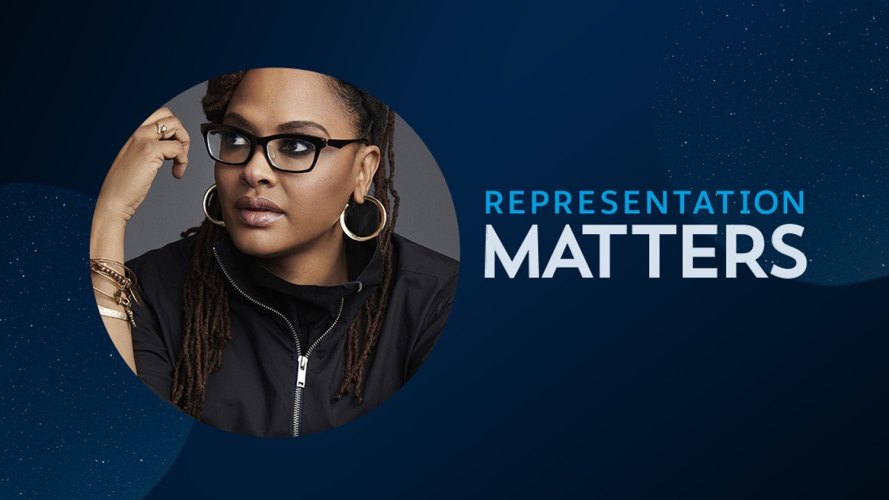Ava DuVernay started creating movies at age 32. Today, she’s the award-winning filmmaker of Selma, 13th, the Netflix miniseries When They See Us, among countless others. DuVernay is a storyteller on a mission. By using her platform for social change, DuVernay addresses urgent topics around race, inequality, and the U.S. criminal justice system — challenging us to question the status quo and advocate for reform.
DuVernay joined Salesforce’s third annual racial equality summit, Representation Matters, and encouraged attendees to challenge language norms, address biases we may hold, and support racial equality. We had the opportunity to learn about her life and work in this exclusive conversation in the virtual backstage. Here are some excerpts from the conversation, edited for clarity.

Navigating a career change
DuVernay started out as a film publicist in Hollywood, still moonlighting as one when she began exploring a new career path. To become a filmmaker, she put in countless hours in the evenings and weekends, writing scripts, and studying.
“I was able to do it in steps. As opposed to holding you back, your day job gives you the buffer of protection so you can put your toe in the water, experiment with things. I think a lot of people are stuck in like, ‘I have to make a career change, and it must happen now.’ Not necessarily. Use this time to experiment, to explore, investigate, to try, to test, and then eventually move your way into it. I think it’s really a beautiful way to start a new career when you’re transitioning from another, because you have a soft place to land.”
Challenge your beliefs
DuVernay understands the power media has, that’s why she founded ARRAY, a film distribution studio, to amplify the images and stories by people of color and women directors. Media has the ability to influence our perception of the world and what we think is possible. Over time, we start to build beliefs which can then form into negative and even harmful stereotypes against communities. DuVernay calls us to challenge these ideas and biases.
“One saying that I really embrace, ‘Don’t believe everything you think.’ Why do you think it? Who put that thought there? How do you know that it’s true? Challenge that, educate yourself, and allow yourself to grow and expand, as it relates to these issues.”
“This goes for all of us. It’s a constant process. And the more we can embrace that, and know that, and abide by that, the better we’ll be,” she said.
Use art to advocate for police reform
DuVernay launched the Law Enforcement Accountability Project (LEAP) earlier this year. LEAP invites artists to help us create narrative change around the accountability of law enforcement and the killing and abuse of Black people.
It’s a two-year project that will fund 24 artist projects across disciplines — film, theater, photography, fine art, music, poetry, literature, sculpture, and dance. It operates on the belief that change begins with the stories we tell each other about the police and the Black community.
“The hope is that by the time we get to the end of it, we’ve been able to reframe this notion that we can’t know the names of police officers who offend and abuse,” DuVernay explained.
“We are taxpayers who pay these people’s salaries, and we should be able to know what’s going on and to hold them accountable when they abuse power. That’s what that project is about.” Learn more about how you can support LEAP.
Be a racial equality advocate, take responsibility
As we face ongoing systemic racism and racial injustices against the Black community with the killings of George Floyd, Breonna Taylor, Ahmaud Arbery, Jacob Blake, and countless more — we all need to be advocates for racial equality and justice, and support the Black community.
“People need to take responsibility for their education around these issues. It is no longer acceptable to say, ‘I didn’t know.’ It’s just not,” said DuVernay.
“There’s too much information and resources out there. You like podcasts? Find the podcasts. You like books, movies, documentaries, lectures? Information on racial oppressions exists and is available to you,” said DuVernay.
“And so there’s really no excuse. The whole, ‘I didn’t know thing,’ — it’s passed, and it’s not going to work anymore. Take it upon yourself to educate yourself and be responsible for what’s going on.”
Watch Ava DuVernay’s keynote during our Representation Matters event and all the sessions from the event below:
There is still work to be done on this path toward Equality, using our platform for these important discussions is only one stop along this path. Earlier this year, we established the Racial Equality and Justice Taskforce to help drive systemic change in our workplace and community, and we will continue to provide updates on our Equality efforts. Learn more at Salesforce.com/Equality





























